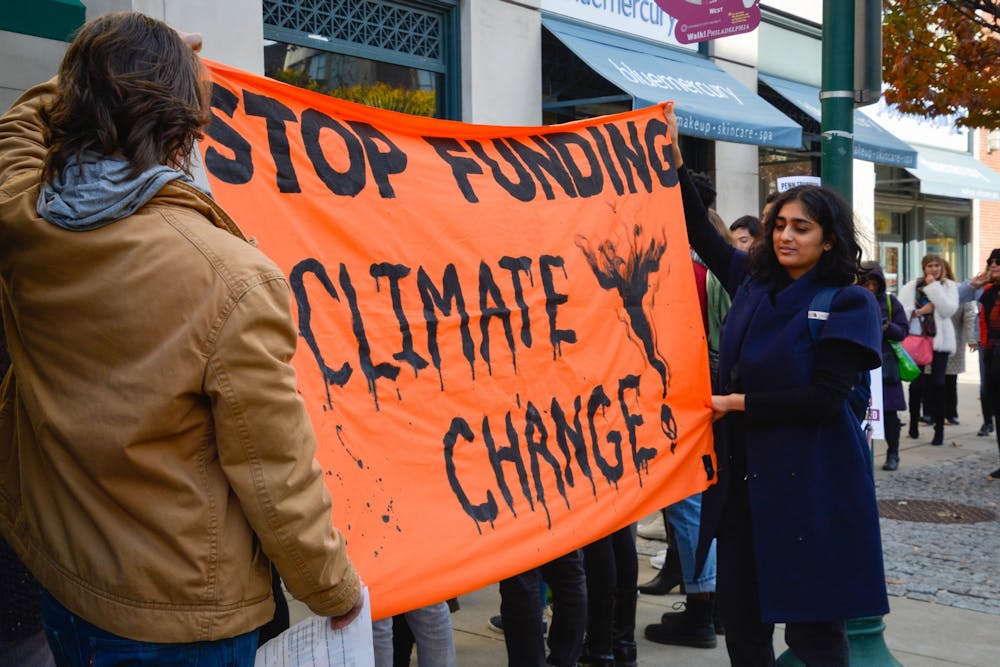On Friday, Nov. 8, a large group of students from Fossil Free Penn disrupted the University’s Board of Trustees meeting. For half an hour, until the meeting was adjourned, they sang and chanted their sole demand: that Penn President Amy Gutmann, Board of Trustees Chair David Cohen, and Chief Investment Officer Peter Ammon agree to a town hall meeting with students about fossil fuel divestment.
A large number of faculty have signed the following open letter:
The Penn students involved in Fossil Free Penn have called on the University to recognize its ethical responsibilities and to more fully embrace a leadership role in the fight against climate change. Indeed, they have had to go to great lengths to get the University’s attention. While not all of us agree on every tactic the students may employ, we as faculty urge our colleagues and University administrators to hear them out, engage them constructively, and take much bolder action. At the very least, the University leadership should agree to the town hall that the students are calling for and commit to a candid and open-minded deliberative dialogue on this uniquely pressing issue. Further, we believe that Penn should join the list of universities that have divested from fossil fuels, signaling an institutional commitment to the goals set forth by the Intergovernmental Panel on Climate Change in October 2018.
The thousands of scientists who contributed to the IPCC report agree on the need for radical reductions in greenhouse gas emissions: 45% by 2030, to reach net-zero by 2050. This will not be achieved without major adjustments in the ways energy is produced and consumed.
Penn can lead the Ivy League in making the changes that will be needed across society to avoid the most devastating effects of climate change. Columbia University and Stanford University have already taken the step to divest from coal companies. In September 2019, the entire University of California system announced its divestment from fossil fuel companies.
The trustees have a historic opportunity to create a serious divestment plan. In 2016, Cohen, who chairs the Board, outlined the trustees’ reasons for not using the endowment to make a public policy statement on the need for climate action. It is time to rethink this position. With hundreds of millions of lives at stake across the globe in the coming decades, the unabated exploitation of fossil fuel resources meets the standard identified by Cohen: a “moral evil.” In addition, Cohen stipulates that “a specific company or companies identified for divestment must have a clear and undeniable nexus to the moral evil,” but this is possible: Two-thirds of all greenhouse gas emissions, for example, can be traced to only 90 firms active in fossil fuel and cement production, including 50 investor-owned firms.
In addition, the moral imperative to consider the climate crisis should lead the Board of Trustees to consider other proactive investment strategies, including “long green” objectives. The University of California system, for example, was the first major educational institution to invest in a consortium for sustainable energy solutions. Penn should consider becoming the first Ivy to join this club.
We recognize that the University leadership has many obligations and responsibilities, and that these are not easily reconciled. But humanity has not faced a threat like climate change before. We owe it to our students to do all we can to protect the world they are inheriting.
Julia Alekseyeva, English
Nikhil Anand, Anthropology
Daniel A. Barber, Architecture
Sandra Barnes, Anthropology, Emeritus
Herman Beavers,English,Africana Studies
Ericka Beckman, Romance Languages
Anne Berg, History
S. Pearl Brilmyer, English
Kathleen Brown, History
Max Cavitch, English
Robin Clark, Linguistics
Daniel Aldana Cohen, Sociology
Thomas L. Daniels, City and Regional Planning
Karen Detlefsen, Philosophy
Robert J. DeRubeis, Psychology
Jane Dmochowski, Earth and Environmental Science
Ivan Dmochowski, Chemistry
Jamal J. Elias, Religious Studies
David L. Eng, English
James English, English
Jed Esty, English
Ann Farnsworth-Alvear, History
Nancy Farriss, History, Emerita
Marc Flandreau, History
Ian Fleishman, Germanic Languages and Literatures
Steven Feierman, History and Sociology of Science, Emeritus
Kristen R. Ghodsee, Russian and East European Studies
Andrea Goulet, Romance Languages
Marie Gottschalk, Political Science
Erick Guerra, City and Regional Planning
Michael G. Hanchard, Africana Studies
Kathryn Hellerstein, Germanic Languages and Literatures
Sophie Hochhäusl, Architecture
Andrew E. Huemmler, Engineering & Applied Science
Sarah Jackson, Annenberg
Daniel H. Janzen, Biology
Michael Jones-Correa, Political Science
David Kazanjian, English and Comparative Literature
Suvir Kaul, English
D. Brian Kim, Russian and East European Studies
Steven O. Kimbrough, Operations, Information and Decisions
Konrad Kording, Bioengineering and Neuroscience
Marisa Kozlowski, Chemistry
Zachary Lesser, English
Michael Z. Levy, Epidemiology
Walter Licht, History
Susan Lindee, History and Sociology of Science
Jessa Lingel, Annenberg
Ania Loomba, English
Kenneth R Lum, Fine Arts
Thomas E. Mallouk, Chemistry
Randall Mason, Historic Preservation
E. Ann Matter, Religious Studies, Emerita
Karen M’Closkey, Landscape Architecture
Projit Bihari Mukharji, History & Sociology of Science
Carol Muller, Music
Sheila Murnaghan, Classical Studies
Benjamin Nathans, History
Anne Norton, Political Science
Eric W. Orts, The Wharton School
Josephine Park, English
Kathy Peiss, History
Kevin M. F. Platt, Russian and East European Studies
Benjamin C. Pierce, Computer and Information Science
Karen Redrobe, History of Art, Wolf Humanities Center
Daniel K. Richter, History
Simon Richter, Germanic Languages and Literature
Megan Robb, Religious Studies
Sophia Rosenfeld, History
Megan Ryerson, City & Regional Planning/Electrical & Systems Engineering
Thomas Max Safley, History
Paul K. Saint-Amour, English
Melissa Sanchez, English
Jeffery G. Saven, Chemistry
Donovan Schaefer, Religious Studies
Eric J. Schelter, Chemistry
Kim A. Sharp, Biochemistry and Biophysics
Daniel J. Singer, Philosophy
Eric A. Stach, Materials Science and Engineering
Emily Steinlight, English
Jim Sykes, Music
Kok-Chor Tan, Philosophy
Deborah Thomas, Anthropology
Jolyon Thomas, Religious Studies
Neil C. Tomson, Chemistry
Heidi Voskuhl, History and Sociology of Science
David Wallace, English & Comparative Literature
Anna Weesner, Music
Scott Weinstein, Philosophy
Michael Weisberg, Philosophy
Steven Weitzman, Religious Studies
Simone White, English
Bethany Wiggin, Germanics, Environmental Humanities
Emily Wilson, Classical Studies, Comparative Literature
Daniel Wodak, Philosophy
Dagmawi Woubshet, English
Aaron Wunsch, Historic Preservation
Chi-ming Yang, English
Guobin Yang, Annenberg/Sociology









